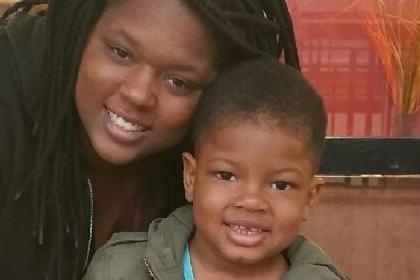
(2-22-16) Maryland Judge Hayward West should be congratulated on his decision to place Romechia Simms, the Maryland mother found pushing her dead child on a swing last year, in treatment for her schizophrenia rather than sending her to jail.
Simms had stopped taking her medication when she became psychotic, began hearing voices, and took Ji’Aire Lee to a park where she pushed him in a bucket swing for more than 40 hours, including in the rain. The 3 year-old died of hypothermia and dehydration.
Public defender Elizabeth Connell said the agreement to keep Simms in community treatment represented a “progressive way of thinking” and was a “testament to the progress of science and society.” I agree.
Charles County State’s Attorney Tony Covington wasn’t pleased, but said he didn’t have much choice after three psychologists found Simms not criminally responsible for her actions.
Simms will be allowed to remain in the community but must follow a long list of conditions, according to a story in the Washington Post written by Fenit Nirappil. Among the rules, she will be monitored by state psychologists, she must avoid unsupervised contact with children and must submit to blood tests to verify she is on medication.
Several statements by Prosecutor Covington caught my eye. He said that the boy didn’t have to die.
He blamed Vontasha Simms for not keeping better watch over her daughter. He asked why social service agencies didn’t follow up to ensure Ji’Aire’s safety after Romechia was hospitalized because of an episode in February. And he asked why a D.C. judge agreed to allow Romechia Simms to have partial custody of the child just 11 days before his death when there was a history of mental-health issues.
I understand Covington’s frustration. Prosecutors see themselves as defenders of the victim and, as he correctly noted, little Ji’Aire shouldn’t have died that day in May. Someone should be blamed. But who?
As the father of an adult son with a mental illness, I find attacks on the parents ill conceived. Based on earlier stories, Simms’s mother had tried to get her daughter help, but Romechia was an adult and we all know that parents’ hands are often tied in most incidents if their adult child refuses help. Criticizing parents also assumes that they knew how to get their loved one help in a confusing system that often is not parent friendly.
Is the hospital at fault? What hospital monitors a patient nearly three months after they are discharged?
How about social service agencies? Budget cuts have created a triage system in social service agencies where overburdened case workers are limited in focusing on only the most glaring cases. Should we expect case workers to keep track of everyone who is discharged from a mental hospital and, if so, for how long?
How about the judge? Should having a mental illness disqualify an individual from having custody of a child? Certainly not.
It’s easy to cast blame after a tragedy. But offering solutions is not so simple.
Still, Covington’s finger-pointing should not be ignored. The question is not “Who should be blamed?” but what steps could be taken to insure that tragedies like this are not repeated.
Clearly, parents and family members, who are worried about a loved one, should not have their concerns disregarded. Hospitals should coordinate follow up care with social service agencies when someone is released. Budgets for social services should be increased so that case managers can keep tabs on those who need help. (Romechia was on welfare and living in a motel when she had her break so someone must have been aware of her case.) If someone is taking psychotropic medicine, the doctor who issued that medication should be obligated to monitor his patient.
But those remedies do not address a bigger and trickier question. When does society decide that an individual with a mental illness needs to be monitored and needs to adhere to the long list of conditions like those that Judge West has now put into action?
Safe-guarding the civil rights of someone who has been diagnosed with a mental illness without stigmatizing them while taking steps to intervene if that individual needs help – that is an issue that is not so easy to resolve.



